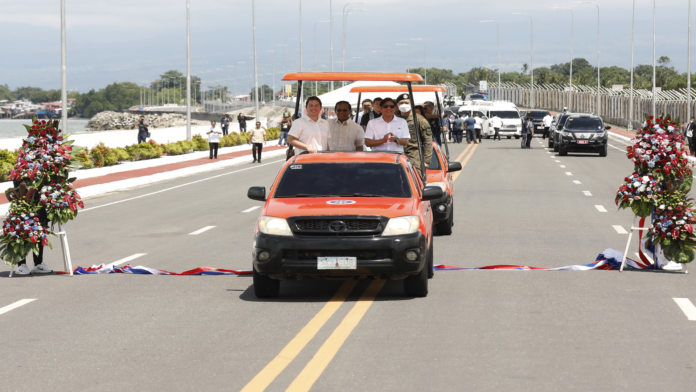President Ferdinand R. Marcos Jr. on Saturday urged the Department of Public Works and Highways (DPWH) and its development partners to ensure the timely completion of the three other segments of the Davao City Coastal Bypass Road Project.
Marcos made the call as he congratulated the DPWH, Japan International Cooperation Agency (JICA), and all stakeholders for the inauguration of the first phase of the Davao City Coastal Bypass Road Project.
“Despite the challenges brought about by the Covid-19 pandemic, we have witnessed this project slowly progress. Six years now, since the project has begun, we now stand in front of the first completed segment,” he said during the inauguration ceremony held in Davao City.
“I call on the DPWH and everyone involved in this and all the other infrastructure projects, the work needs to be done. Strive to finish the remaining segments and let us do it within schedule so that our people may reap and will truly enjoy the maximum benefits of your hard work,” Marcos added.
The President cited his predecessor, Rodrigo Duterte, for being instrumental in introducing “high-impact” infrastructure projects such as the Davao City Coastal Bypass Road Project.
Marcos said the completion of the first phase of the project is expected to ease traffic congestion and spur economic growth in Davao City.
“We expect this already to provide some relief to Mindanaoans, especially those who wish access to downtown Davao (City). This will help in transporting goods in and out of the city, making access to basic necessities easier for communities, for businesses, and for consumers,” he said.
He also emphasized that the road project which features walkways, bicycle lanes, and linear parks would address people’s need for “comfort, happiness and well-being.”
“I can imagine the locals and especially our tourists taking a stroll while looking at the view, feeling the breeze coming in from the coast, and taking with them the energy and peace they need to go about with their daily lives, with memories of Davao City and the Philippines,” he said.
He also noted that the Davao City Coastal Bypass Road Project was anchored on “well-thought-out master plans,” stressing that it also aims to protect the city from storm surges.
Marcos said closer cooperation and collaboration between the government and its partners from the private sector are vital in making the Philippines an “interconnected and thriving” nation.
“Everything that we have done so far and everything that we will do from this point onwards will all be instrumental in our collective leap forward and upward,” he said.
Meanwhile, Davao City Mayor Sebastian Duterte, who was also present during the inauguration, thanked the national government for the timely completion of the first and longest segment of the project.
“It is a testament to our shared commitment to promote suburban development and reduce traffic congestion in Davao City. With the opening of Segment A, we now have a road network projected to facilitate economic growth and ease traffic conditions in the heavily residential southern part of the city,” he said.
The completion of the project would strengthen the overall reliability of the city’s infrastructure and transportation systems in preparation for population growth and increased economic activity in the years ahead, he said.
“We thank all the individuals who gave their time and talent for the completion of this segment and all the officials to make this project possible,” he added.
Earlier this month, the DPWH-11 said it is targeting the completion of all phases of the Davao City Coastal Bypass Road Project by 2025.
The Philippine government, with JICA’s assistance, has pursued the Davao City Coastal Bypass Road Project, one of the major road projects included in the Infrastructure Modernization for Davao City (IM4 Davao) that will provide support in the city’s urban infrastructure development plan.
Before delivering a speech, Marcos conducted an inaugural drive-through along a part of the coastal bypass road.
The road project’s Segment A inaugurated Saturday covers the coastal lines of Bago Aplaya- Times Beach Section (Talomo-Matina).
The Davao City Coastal Bypass Road Project stretches from the Davao-Cotabato junction, passing through the coastal lines of Bago Aplaya, Talomo, Matina Aplaya (Times Beach), Roxas Avenue Section to Santa Ana Wharf, then R. Castillo.
It aims to strengthen Davao City’s road network in meeting traffic demands, promote suburban development and decongest the city center.
It will serve as an alternative route to Davao–Cotabato Road and ABS-CBN Diversion Road to ease traffic congestion from the Central Business District in the area.
Once completed, travel time from the Toril area going to the city proper will be reduced from one hour and 45 minutes to just 30 minutes, and urbanization will be dispersed outside the Davao City urban center.
The coastal shore protection and breakwater that will be incorporated into the project will also protect Davao City from sea wave actions, water surges and soil erosion. (PNA)


